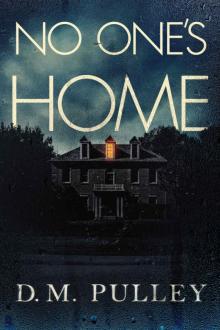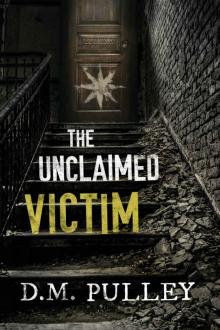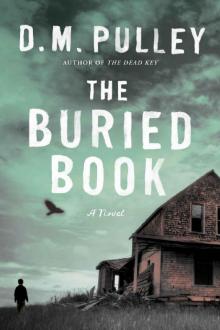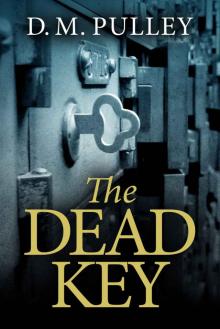- Home
- D. M. Pulley
The Unclaimed Victim Page 5
The Unclaimed Victim Read online
Page 5
Ethel jerked it away and raised her fist, but the girl just stood there smiling, welcoming the punch with open arms. It was more unnerving than the opening snap of a knife. “Are you nuts? I don’t need your help, little girl. I don’t need your Jesus, and I don’t need your Goddamned pamphlets!” Ethel threw the leaflet in the girl’s face.
Mary Alice didn’t flinch. “What do you need, Sister?”
Ethel felt her guard slip for just a moment, exposing the raw skin beneath it for the first time in . . . months? Years? What do I need? She hadn’t dared to even hope for anything she wanted or needed since—
Ethel shuddered despite herself.
The thought that the girl might have glimpsed the gesture sent a violent urge to claw the poor thing’s eyes out down through Ethel’s broken fingernails. She threw the spent cigarette to the ground and shook it off. It wasn’t the girl’s fault Ethel hadn’t had any luck finding a roof to put over her head. She appraised this Mary Alice Eberly again. Clean gloves. Newer shoes. Full cheeks. Whoever he was, the boss was keeping her well. He couldn’t be half as bad as some of the johns she’d had that day. Men with any real money spent it on younger girls with access to a soft mattress, not old whores like her. Without a proper house, she wouldn’t last much longer. The photographs of Flo Polillo’s hacked-up body hung over her like a warrant. The Butcher was still walking the streets. She might’ve serviced him that very day.
Ethel held the girl’s eyes for several moments, searching for the hollowed shame and grim wisdom that came with being misused. They didn’t have the wide glimmer of a happy child, but they weren’t the worst she’d seen.
“You are searching for something. Aren’t you?” Mary Alice prodded. “I can show you the way of the Lord.”
Ethel weighed her meager options for a moment and decided that nothing the poor girl’s boss might throw at her could be worse than the Cleveland winter still hanging on. She couldn’t take another day walking through the snow in thin leather pumps, trading herself for a few meager hours in the heat of a pub. People like little Mary Alice here think hell is a blazing inferno, but they’re wrong. Hell is cold.
Ethel let her eyes grow heavy with pain and fall to the ground. It wasn’t much of a stretch. “Yeah. Maybe I am searching.”
“Let the Lord into your heart, and you will have nothing to fear.”
Ethel shook her head. “But I can’t. He won’t let me.”
“Jesus doesn’t judge. He died for your sins. He died for you.”
“No. That’s not what I meant.” Ethel made a show of looking up and down the street.
The effect worked, and the girl’s eyes darted around. “Who won’t let you?”
“No one. Forget I said anything. He can’t see me talking to you.” Ethel prided herself on being a good judge of what people wanted, and Mary Alice was dying to save her from a devil.
“Who is he?”
“Nobody. I have to go.”
The girl frowned. “Can we talk again sometime? The Lord has brought us together for a reason.”
Ethel gave the poor thing a smile. It was almost too easy. “I don’t know. I’m not supposed to talk to people. His punishments can be terrible.”
The girl’s eyes swelled as though she shared in the pain. “You must be brave. If the Lord is calling to you, you must answer.”
“I don’t know.” Ethel bit her lip and looked up and down the street again, then said, “Maybe tomorrow. But not here. It can’t be out here on the street.”
Mary Alice nodded fervently. “Come to the Harmony Mission tomorrow evening at five o’clock.”
The girl motioned down the block at the mammoth building towering over the street. Ethel blinked up at the structure, not quite believing that she hadn’t noticed it all afternoon. All she’d seen was the wrought iron fence ringing the lot with its sharp points and the long brick walls blocking the sidewalk from whatever lay on the other side. Go away, it said. And it wasn’t just one building, she realized, but many. A house here. A church there. A prison? No, a factory, but it didn’t have the customary line of haggard men or desperate women clogging the sidewalk, begging for a job.
“There’s a doorway hidden in the courtyard on the south side. Knock on the door twice. We’ll keep you safe.”
Ethel scanned the small windows lining the upper stories of the enormous brick compound. They were clean and unbroken and eerily empty. No drawings, no laundry lines, no little faces pressed to the glass. “Are you sure?”
The girl nodded. “Just don’t be late. There’s a strict schedule.”
What happens if I’m late? But Ethel just nodded. “Alright. I’ll see you tomorrow.”
The girl pressed her paper pamphlet into Ethel’s hand. “I’ll be praying for you, Ambrosia.”
Ethel stuffed the paper into her bodice next to her cash. She didn’t look at it again until much later that evening when it spilled out onto the bar as she fumbled for enough money to pay for her drink. She frowned at the jumble of letters covering the back of the pamphlet, unable to read any of them. On the other side, a crudely drawn devil leered up at her with its pitchfork.
It was holding a severed head.
WOMAN SLAIN,
HEAD SOUGHT IN COAL BINS
Detectives combed the Central Avenue-E. 20th Street section today searching for the head and the remainder of the body of Mrs. Florence Genevieve Sawdey, 41, whose dismembered torso was found yesterday in an alley.
—Cleveland Press, January 27, 1936, p. 1
CHAPTER 7
April 7, 1999
Kris pulled her rusted Jeep into a free spot on Jefferson at six o’clock that evening. When she cut the engine, her veins kept humming with cortisol. Her backpack dug into her shoulder with the weight of her father’s books. Whoever Fights Monsters. Torso. Butcher’s Dozen. The blood she had glimpsed in the deputy’s photographs hung over her head. We’re still looking for the rest of him.
Thurman Avenue, stretching out in front of her for three dingy and run-down blocks, offered no comfort. The one-way street where she lived was more of an alley than a road, flanked by tiny bungalows on one side and the decaying mass of the abandoned Harmony Press factory on the other. Torn chain-link fences lined the postage stamp yards. Most of the asbestos-shingled houses served as cheap rentals for students and fatherless families. A few little old ladies still clung to their childhood homes. Kris saw one of them peeping out a window as she made her way down the narrow street.
A faded whirligig spun aimlessly in the yard as she passed by. The fat, polka-dot-painted ass of a cartoon woman bent over a bucket of wildflowers next to it. A cracked garden gnome held his pipe and grinned up at her. Bumper stickers had been slapped onto the peeling siding of the next house. One loudly proclaimed, Smile! Jesus Loves You!
“Does he?” she muttered to herself.
To her right, a twelve-foot-tall iron gate blocked the yawning arch of the old Harmony Press loading dock. She peered through the bars into the empty cavern. It extended deep into the shadows, a tunnel to nowhere. Closed doors dotted the walls on either side. Concrete porches stepped down to acres of brick pavement that stretched from the sidewalk below her feet back into another courtyard she couldn’t quite see. There was no sign of life anywhere. The factory windows hovering over her head were all dark. The building had been empty for over fifty years according to her roommate, Pete. He’d heard they used to print Bibles inside. Ironic, right? A Bible factory gone out of business? He’d nudged her, trying to impress her with his depth of knowledge and humanity, back before he’d given up on sleeping with her. Their tiny bungalow sat across the narrow alley only a few houses up from the gate. The lights were out there too.
Up on the corner where Thurman hit College Avenue, a boarded-up storefront sat as a reminder of the urban squalor that the yuppies were rapidly renovating away. Thurman Avenue hadn’t succumbed to the wave of gentrification just yet, and the crumbling factory proved it. Her father had managed to find the
most dilapidated street in all of Tremont for her to live. She figured it was just another punishment for moving away. Another test he hoped she’d fail.
A small hunched figure was headed her way. It was wearing an orange bathrobe. Kris crossed the street to avoid it.
“Hello there!” a voice croaked and then let out a cough. “Can you help an old woman get something to eat?”
“I’m sorry,” Kris called back without making eye contact. She fumbled with her keys. “I don’t carry cash.”
It was true, but it still felt like a lie. Kris had learned her first month in Cleveland that giving money to a derelict was inviting a conversation that would never end.
“I understand,” the woman muttered in a phlegmy frog voice. She was almost to Kris’s doorstep. “You lived here long?”
Kris rolled her eyes. She pulled the door open and gave the woman a wave without looking her in the face. “A few months. I really gotta get going. I’m sorry. Good luck to you.”
“No. Good luck to you, honey. You seem like you need it more than m—”
The door shut before the woman could finish. Kris threw the dead bolt and the chain for good measure. She hated being rude, and the whole encounter left her feeling mean and dirty. And sad.
Kris flipped on her kitchen light to find the answering machine blinking on the kitchen counter. As she pressed the button, her heart contracted with the flailing hope it was him.
“Hello. This message is for Miss Kristin Anne Wiley. My name is Robert Weismann from the Lima News. I’m calling in regards to your father, Alfred Ray Wiley. We understand that you visited the Auglaize County Sheriff’s Office this morning and are contesting the identity of a set of remains found in the northern part of—”
Kris slammed her hand onto the delete button. Damn it, Ben! What did you do? Call a frigging press conference?
The next message beeped.
“Krit? You there?” The deep voice crawled through the dusty speaker like it was her bedroom window. Troy wanted something. Ben must’ve given him her new number. She’d disconnected her old one when he wouldn’t stop calling. “I know things have been weird between us, but you’re goin’ through a lot, babe. Call me. I can help if you’d just—”
She unplugged the answering machine before he could finish. She paced her kitchen back and forth several times, debating whether to call up Officer Ben and give him a piece of her mind. It wouldn’t do any good, she realized that. It probably wasn’t even his fault. Bad news spread through a small town like wildfire. There was nothing else to talk about. It would still feel good to yell at someone, though.
After five deep breaths, she pulled the rogue business card out of her pocket and studied it again. Why would a killer leave a business card? she wondered. He wouldn’t, right? Biting her lip, she picked up the phone. Don’t be stupid, Kris, her father warned her from his place in her brain stem. You don’t know a thing about this guy.
Yeah, but this guy doesn’t know me. I could be anyone. What could it hurt? After a few more rounds of debate, she dialed the number.
“Hello. You’ve reached the office of David Hohman and Associates,” a reassuring voice spoke nice and slow, as though talking a jumper off a ledge. “We are a full-service, PISGS-licensed private investigation firm ready to help you with background checks, missing person cases, wrongful death claims, litigation support, or private security. Please leave your name and number, and we will get back to you as soon as possible.”
After a long beep, she just stood there paralyzed, eyes watering, breathing into the phone, wanting to leave a message but too scared to do it. Finally, she just hung up. Rubbing her eyes dry again, she scolded herself for being a hysterical girl. Keep it together, Kris. She scanned David Hohman’s street address embossed on the cardboard, then ran her finger across the indented blue ink that read, www.torsokillers.com.
Kris tossed the card onto the counter and spread her father’s library books across the kitchen table. Each one was about the same killer. She picked up Torso again and thumbed through the black-and-white police photographs in the center of the book with disgust. The Torso Killer apparently got his name by cutting off his victims’ heads and arms and legs. White cakey flesh ripped open at the seams covered each page along with images of men in suits and hats standing under bridges and sifting through the dirt. The dates below the photographs were all from the 1930s.
She snapped the book shut again and tossed it on top of the others. Who reads this horrible stuff? she wondered and tried to picture her dad sitting in his plaid easy chair with a book in his hand. She couldn’t do it. All she could see were hacked-up pieces of him wrapped in plastic bags. A shudder ran down her limbs.
The crude sketch of a headless, armless torso taunted her from behind an acetate book cover. Without prints or dental, it’s going to be tough to make a positive ID. She shook the police officer’s voice from her head and turned away from the murder books, queasy. Whatever they’d found out in the woods didn’t include a head or hands. The thought of him laid out on a metal table like the black-and-white photographs in the books—
She lurched up from her seat on shaky legs and felt the room spin. It had been hours since she’d eaten anything. A dusty bookshelf sagged against the wall with her dwindling supply of ramen noodles and boxed macaroni. Toast crumbs littered the cracked Formica counters. The fridge hummed from its corner of the kitchen, its avocado-green shell dulled by years of use. She staggered over to it. The light inside had burned out long before Kris moved in, and she had to squint to see that half of her food had gone missing.
“Pete,” she muttered weakly. “Dammit. Stop eating my food!”
She glanced over her shoulder, down the narrow hallway to his room. It was empty. Pete had been spending nearly all his time at his girlfriend’s place lately. Ever since he’d figured out that Kris wasn’t interested in hooking up, he’d made himself scarce.
Not scarce enough, she mused, grabbing some turkey from his shelf in the fridge. Her food had a habit of going missing, but her constantly broke roommate swore up and down that he never touched it. Thankfully, he was moving out in May. But of course that meant she’d had to find another roommate—a task that had proved near impossible when she’d first tried it that fall. No other Cleveland State students had answered her ad to live all the way over in Tremont. Just Pete.
Maybe now I can move. The thought stole through her head like a thief.
Forcing down three pieces of processed meat, she grabbed David Hohman’s card and padded across the matted gray carpet in the living room back to her bedroom on the opposite side of the house. She plopped down at her computer and flipped it on, wondering why this stranger was looking for her father and what any of it had to do with a bunch of murders that happened sixty years ago. The word FBI flashed through her head.
As the dial-up Internet connection chirped and whined, she scanned the photographs taped to her walls. Black-and-white portraits of old men at the bus stop mingled with crumbling brick buildings. None of her attempts at art were great, but great felt just an arm’s length away. Tightening the aperture, adjusting the angle, framing the shot—there were just a few tweaks that might make the pictures special, but she couldn’t quite grasp the secret. Instead, she forced herself to study her failures every day, hoping to figure it out.
Her father thought her photos were a waste of time. Anything she wanted to do was foolish as far as he was concerned. Moving to Cleveland, studying art. Not marrying Troy. He thought she should’ve stayed in Cridersville and gone to the local college.
I don’t want to go to Rhodes! Kris had yelled, struggling to keep the tremor she felt out of her voice. One crack in her armor and she knew it would be over.
She could still see him glowering over her in the kitchen back home. She could feel the counter digging into her back.
“Of course you do,” he growled. Debating anything with her made him furious. Rage flashed in his eyes like he was a caged beast. “You
could take your classes and live here rent-free. A school is a school, now dammit!”
She concealed her fear with a smirk and flopped the college ratings onto the kitchen table. It was her ace in the hole. “That’s not exactly what US News & World Report says, Dad. Cleveland State was ranked one of the best values in the state of Ohio four years running. Rhodes didn’t make that list. I mean, sure, staying close to home would be easier but . . .” She paused, choosing her words carefully. “Aren’t you always telling me to make decisions with my head and not my emotions?”
What he’d actually told her was to stop thinking like a stupid girl. His pointed glance said as much, but he looked at the magazine in spite of himself.
“CSU costs the same as Rhodes, and it has so much more to offer. I could study business or law. There are work-study programs—”
He held up his hand to silence her. “That city is a cesspool. I’m not sending my only daughter up there. It’d be like sending a sheep to the slaughter!”
“Like hell.” She crossed her arms defiantly and pressed the only button she had—his pride. “You taught me how to take care of myself, right? How to survive in the wilderness, how to shoot a coyote, how to field dress a buck. You did not raise a sheep!”
He gave her a cool appraisal as though debating how to take her down and eat her alive. She just stared back, willing herself not to squirm, holding on by a thread. Finally, he just shook his head. “You aren’t going to let this go, are you?”
“No, I won’t.” The sound of steel in her voice surprised her, given the quaking emotions she felt inside. She’d won. She’d actually won.
“You’re gonna have to earn your own room and board, understand me? You’ve taken that cost on yourself.” He shook his head, and his shoulders slumped in resignation.
“Of course.” She nodded eagerly but could feel him divorcing himself from her and the entire situation with each word. He hated to lose a game of cards, let alone an argument.

 No One's Home
No One's Home The Unclaimed Victim
The Unclaimed Victim The Buried Book
The Buried Book The Dead Key
The Dead Key